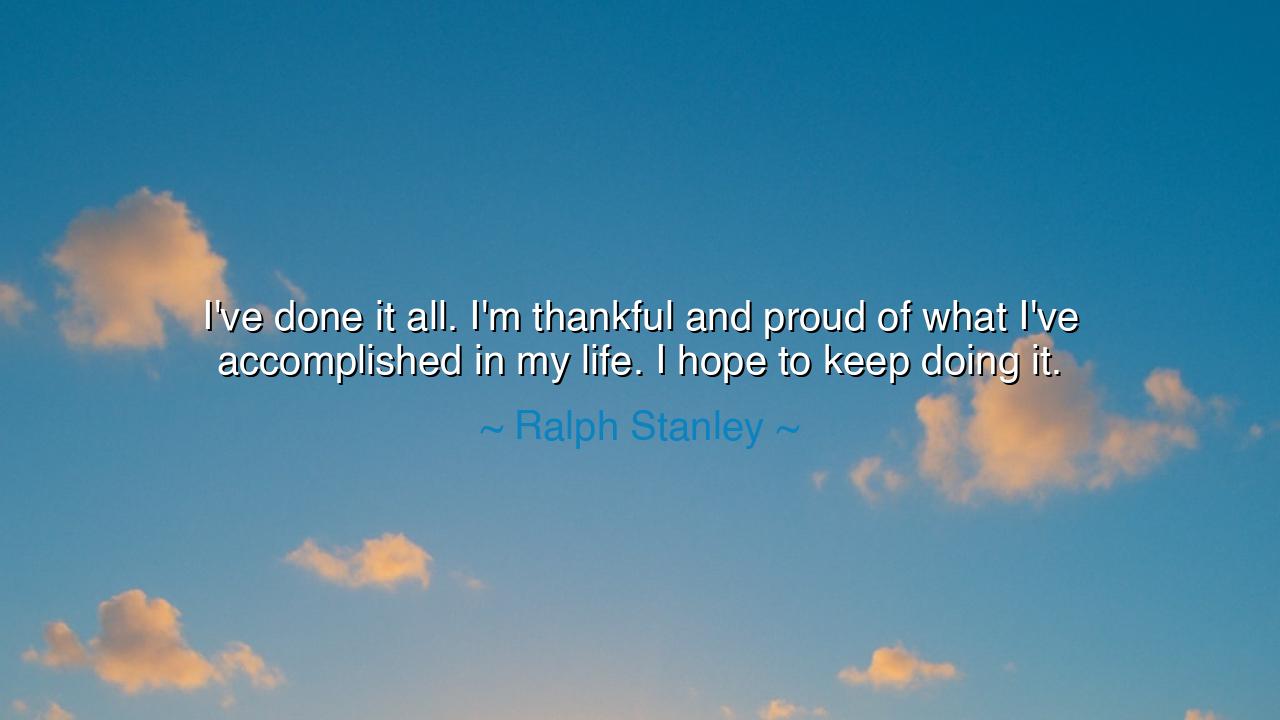
I've done it all. I'm thankful and proud of what I've
I've done it all. I'm thankful and proud of what I've accomplished in my life. I hope to keep doing it.






When Ralph Stanley declared, “I’ve done it all. I’m thankful and proud of what I’ve accomplished in my life. I hope to keep doing it,” he spoke with the voice of one who has lived fully, poured himself into his craft, and reached a place where pride is not arrogance but the quiet satisfaction of a life well-spent. His words ring with the wisdom of a man who carried the traditions of bluegrass and mountain music through decades, shaping generations and leaving behind a sound that echoes in eternity. To say “I’ve done it all” is not to boast of worldly conquest, but to recognize that one has walked the road of purpose without regret.
The origin of this truth lies in Stanley’s lifelong devotion to music. Born in the mountains of Virginia, he carried forward the ancient songs of Appalachia, blending the old with the new, ensuring that the voice of his people would never be forgotten. In this, he accomplished not only personal success but the preservation of cultural memory. His words reveal a spirit that is both thankful and proud—thankful for the blessings of opportunity and endurance, proud for having remained true to his calling. His legacy is not measured only in awards or fame, but in the lives touched by the haunting strains of his banjo and voice.
This attitude has been shared by the greats of history. Consider Leonardo da Vinci, who near the end of his life reflected on his creations, both finished and unfinished. He had explored art, science, anatomy, invention—he had indeed “done it all.” Though restless, he remained proud of his work, even when imperfect, for he knew he had devoted himself fully to discovery. Likewise, Ralph Stanley knew that no life is free from imperfection, yet to live one’s days with devotion and to leave behind a legacy is itself the highest accomplishment.
Stanley’s humility is shown in the second half of his statement: “I hope to keep doing it.” Here lies the heart of a true craftsman and servant of his art. Even after decades of achievement, after countless songs sung and stages conquered, he was not content to rest in past triumphs. Instead, he longed to continue, to keep giving, to remain faithful to the gift entrusted to him. This is the mark of greatness: not to glory in the past, but to remain alive in the present, ever eager to work while life remains.
There is also a profound balance in his words. Pride without gratitude hardens into arrogance, while gratitude without pride may collapse into passivity. Stanley holds both: he is thankful for the life he has lived, and proud of what he has built. The ancients would call this harmony the golden mean—where one embraces the blessings of fortune while honoring the labor of one’s own hands. It is a lesson for us all: that gratitude and pride are not enemies, but companions when held in humility.
The lesson here is clear: live in such a way that at the end of your days, you too may say, “I’ve done it all.” Not in the sense of conquering every mountain or winning every crown, but in having lived true to your gifts, faithful to your purpose, steadfast in your labor. Let your days be filled with works that endure, so that your pride is not empty boasting but a reflection of the life you poured out fully. And let your gratitude keep you humble, remembering always that the chance to live and create is itself a blessing.
Practical wisdom follows. Do not wait until the end of life to reflect with pride and gratitude. Each day, build something worth remembering. Pursue your craft, your calling, your relationships with integrity, so that when you speak of your life you will have no regret. Be thankful for the opportunities that come, no matter how small, and be proud when you have given your best. And like Stanley, never stop striving; continue your work, your growth, your giving, for as long as breath remains in you.
Thus, in the words of Ralph Stanley, we hear an eternal song: the joy of a life lived with purpose, the harmony of thankfulness and pride, and the unquenchable fire of perseverance. Let us then live so that we, too, may one day declare that we have “done it all,” not with arrogance, but with gratitude, and with the hope that until our final breath, we may keep doing the work we were born to do.






AAdministratorAdministrator
Welcome, honored guests. Please leave a comment, we will respond soon